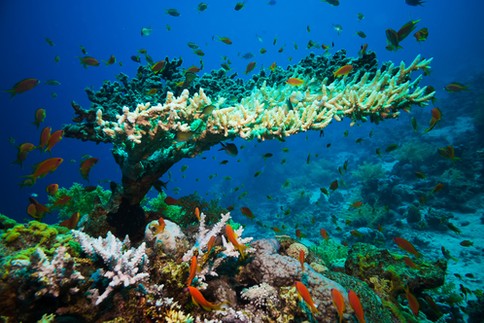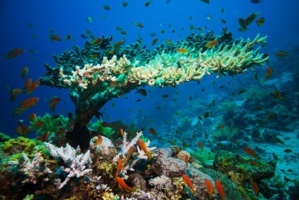As per a new report released by the World Wide Fund for Nature (WWF), the estimated wealth the oceans contain is as much as the size of one of the world’s leading economies - $24 trillion. This wealth in our economic powerhouse that covers more than 70% of our planet, is gradually being eroded thanks to our misuse, over-exploitation of its resources as well as climate change.
Titled ‘Reviving the Ocean Economy’ the WWF report is a joint collaboration between the Boston Consulting Group (BCG) and The Global Change Institute of the University of Queensland.
“The ocean rivals the wealth of the world’s richest countries, but it is being allowed to sink to the depths of a failed economy. As responsible shareholders, we cannot seriously expect to keep recklessly extracting the ocean’s valuable assets without investing in its future,” says Marco Lambertini, WWF International’s Director General.
If one were to compare the oceans wealth to that of the world’s top 10 economies, it would rank 7th. According to a study, its annual value of good services comes to more than $2.5 trillion.
After 9 years of intense negotiations amongst 193 countries in consultation with a U.N Working Group, last January an agreement was hammered out in which these 193 countries managed to agree on a legally binding treaty that conserves the genetic resources as well as marine life in the lawless space which is commonly referred to as the high seas.
As per the United Nations, the area that we commonly refer to as the high seas is that large expanse of ocean which is beyond any country’s exclusive economic zone (EEZ). In other words it is that portion of the ocean which lies beyond the continental shelf of any individual country. Covering almost 50% of the earth’s surface, it includes some of the critically threatened, and yet most important from an environmental perspective, ecosystems of our planet.
As per Dr. Palitha, a former Permanent Representative at the U.N who co-chaired its Working Group, the oceans have been identified as the next frontier by large pharmaceutical companies which want to exploit lucrative living and non-living organisms which are present in large quantities in the high seas.
“The technically advanced countries, which are already deploying research vessels in the oceans and some of which are currently developing products, including valuable pharmaceuticals, based on biological material extracted from the high seas, were resistant to the idea of regulating the exploitation of such material and sharing the benefits,” said Dr. Palitha.
This report will culminate into the creation of an international treaty which can be best described as a ‘High Seas Biodiversity Agreement’ will go a long way in addressing the “the inadequate, highly fragmented and poorly implemented legal and institutional framework that is currently failing to protect the high seas – and therefore the entire global ocean – from the multiple threats they face in the 21st century.”
As per the study, Climate Change is the leading factor that is the reason for the deteriorating health of our oceans. Global warming too plays a major role, but Climate Change, it says is inducing an increase in the ocean’s acidity, which will take hundreds of years to repair.
As per the Report, another major cause for our ocean’s ill health is over-exploitation: 90% of the global fish stock is either over-exploited or fully exploited. The Pacific bluefin tuna alone has dropped by 96% from its original unfished levels.
“The ocean feeds us, employs us, and supports our health and well-being, yet we are allowing it to collapse before our eyes. If everyday stories of the ocean’s failing health don’t inspire our leaders, perhaps a hard economic analysis will. We have serious work to do to protect the ocean starting with real global commitments on climate and sustainable development,” said Lambertini.
References:
Titled ‘Reviving the Ocean Economy’ the WWF report is a joint collaboration between the Boston Consulting Group (BCG) and The Global Change Institute of the University of Queensland.
“The ocean rivals the wealth of the world’s richest countries, but it is being allowed to sink to the depths of a failed economy. As responsible shareholders, we cannot seriously expect to keep recklessly extracting the ocean’s valuable assets without investing in its future,” says Marco Lambertini, WWF International’s Director General.
If one were to compare the oceans wealth to that of the world’s top 10 economies, it would rank 7th. According to a study, its annual value of good services comes to more than $2.5 trillion.
After 9 years of intense negotiations amongst 193 countries in consultation with a U.N Working Group, last January an agreement was hammered out in which these 193 countries managed to agree on a legally binding treaty that conserves the genetic resources as well as marine life in the lawless space which is commonly referred to as the high seas.
As per the United Nations, the area that we commonly refer to as the high seas is that large expanse of ocean which is beyond any country’s exclusive economic zone (EEZ). In other words it is that portion of the ocean which lies beyond the continental shelf of any individual country. Covering almost 50% of the earth’s surface, it includes some of the critically threatened, and yet most important from an environmental perspective, ecosystems of our planet.
As per Dr. Palitha, a former Permanent Representative at the U.N who co-chaired its Working Group, the oceans have been identified as the next frontier by large pharmaceutical companies which want to exploit lucrative living and non-living organisms which are present in large quantities in the high seas.
“The technically advanced countries, which are already deploying research vessels in the oceans and some of which are currently developing products, including valuable pharmaceuticals, based on biological material extracted from the high seas, were resistant to the idea of regulating the exploitation of such material and sharing the benefits,” said Dr. Palitha.
This report will culminate into the creation of an international treaty which can be best described as a ‘High Seas Biodiversity Agreement’ will go a long way in addressing the “the inadequate, highly fragmented and poorly implemented legal and institutional framework that is currently failing to protect the high seas – and therefore the entire global ocean – from the multiple threats they face in the 21st century.”
As per the study, Climate Change is the leading factor that is the reason for the deteriorating health of our oceans. Global warming too plays a major role, but Climate Change, it says is inducing an increase in the ocean’s acidity, which will take hundreds of years to repair.
As per the Report, another major cause for our ocean’s ill health is over-exploitation: 90% of the global fish stock is either over-exploited or fully exploited. The Pacific bluefin tuna alone has dropped by 96% from its original unfished levels.
“The ocean feeds us, employs us, and supports our health and well-being, yet we are allowing it to collapse before our eyes. If everyday stories of the ocean’s failing health don’t inspire our leaders, perhaps a hard economic analysis will. We have serious work to do to protect the ocean starting with real global commitments on climate and sustainable development,” said Lambertini.
References:






